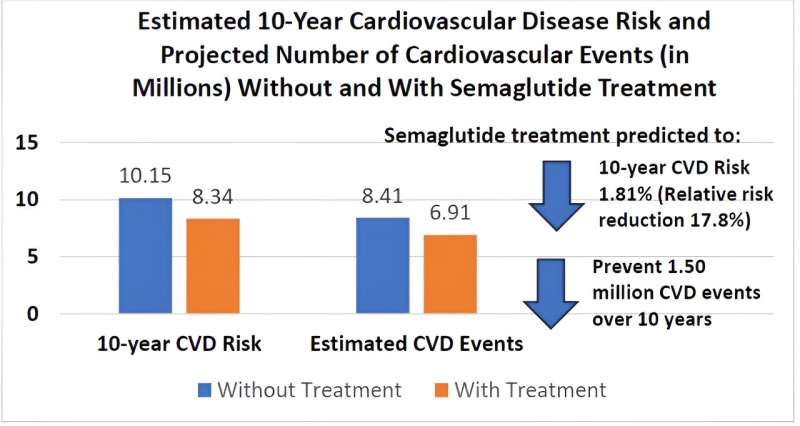This article has been reviewed according to Science X's editorial process and policies. Editors have highlighted the following attributes while ensuring the content's credibility:
fact-checked
peer-reviewed publication
trusted source
proofread
Recent study finds that semaglutide medication may benefit 93 million U.S. adults

Researchers from the University of California, Irvine have just published a study that projects 93 million U.S. adults that are overweight and obese may be suitable for the 2.4 mg dosage of semaglutide, a weight loss medication known under the brand name Wegovy.
They projected based on the known weight loss effects (15% average weight loss) of this therapy that its use could result in 43 million fewer people with obesity, and prevent up to 1.5 million heart attacks, strokes, and other adverse cardiovascular events over 10 years.
The study, US Population Eligibility and Estimated Impact of Semaglutide Treatment on Obesity Prevalence and Cardiovascular Disease Events was published in the journal Cardiovascular Drugs and Therapy, and was led by Nathan D. Wong, Ph.D., professor and director of the Heart Disease Prevention Program in the Division of Cardiology at the UCI School of Medicine. Wong also recently presented his teams findings at the American College of Cardiology scientific sessions in March 2023.
The analysis is based on results from the STEP 1 trial, published in 2021 in the New England Journal of Medicine, which showed the 2.4 mg dosage of semaglutide approved by the FDA for the treatment of obesity reduced body weight by an average of 14.9% along with reductions in several cardiovascular risk factors such as blood pressure and lipids.
The study projected 93 million U.S. adults (based on National Health and Nutrition Examination Survey data) who are overweight or obese would fit STEP 1 eligibility criteria and that treatment with the drug would result in 43 million fewer persons with obesity. Wong and colleagues applied body mass index and other risk factor changes to cardiovascular disease risk scores among an estimated 83 million persons without pre-existing cardiovascular disease, estimating a reduction in 10-year cardiovascular disease risk of 1.8% from 10.15% to 8.34% (or a relative risk reduction of 18%), projecting up to 1.5 million cardiovascular events could be potentially prevented in 10 years. The analysis did not estimate the additional cardiovascular events that might be prevented from treatment among the approximately 10 million estimated eligible persons with cardiovascular disease.
The projected 18% reduction in cardiovascular events in persons who are overweight or are obese but without cardiovascular disease compares favorably to the recently announced top line results of the SELECT trial, which studied Wegovy in persons with cardiovascular disease and showed an actual 20% reduction in future cardiovascular events. "It is one of the biggest advances in the obesity and cardiovascular medicine world," said Wong.
"We now have a weight control therapy that also significantly reduces cardiovascular events beyond the diabetes population where it was originally studied," said Wong. "It should be considered for patients who are obese or overweight with other risk factors where cardiovascular disease is their leading cause of disability and death." Since drugs in this class have side effects, it is important that patients always discuss the risks and benefits of such therapies with their physician. Additionally, an appropriate dietary and physical activity regimen is always the foundation of weight management and cardiovascular risk reduction.
Additionally, Wong noted that given the costs of these therapies, that better access is needed for our high risk underserved populations who may benefit from them.
Wegovy is a glucagon-like peptide 1 receptor agonist (GLP1-RA) injectable therapy approved by the Federal Drug Administration (FDA) for chronic weight management in adults with who are obese or overweight with at least one weight-related condition, such as high blood pressure, type 2 diabetes, or high cholesterol. Wegovy is to be used in addition to a reduced calorie diet and increased physical activity.
More information: Nathan D. Wong et al, US Population Eligibility and Estimated Impact of Semaglutide Treatment on Obesity Prevalence and Cardiovascular Disease Events, Cardiovascular Drugs and Therapy (2023). DOI: 10.1007/s10557-023-07488-3




















